Accounting Policies for Emissions Trading System under EU ETS
VerifiedAdded on 2022/10/10
|9
|2074
|164
AI Summary
This article discusses the accounting policies for emissions trading system under EU ETS. It covers the recognition of emissions allowances, their initial recognition, and the accounting treatment of emissions allowances under the EU ETS. It also evaluates the effectiveness of the EU ETS from a climate policy perspective.
Contribute Materials
Your contribution can guide someone’s learning journey. Share your
documents today.
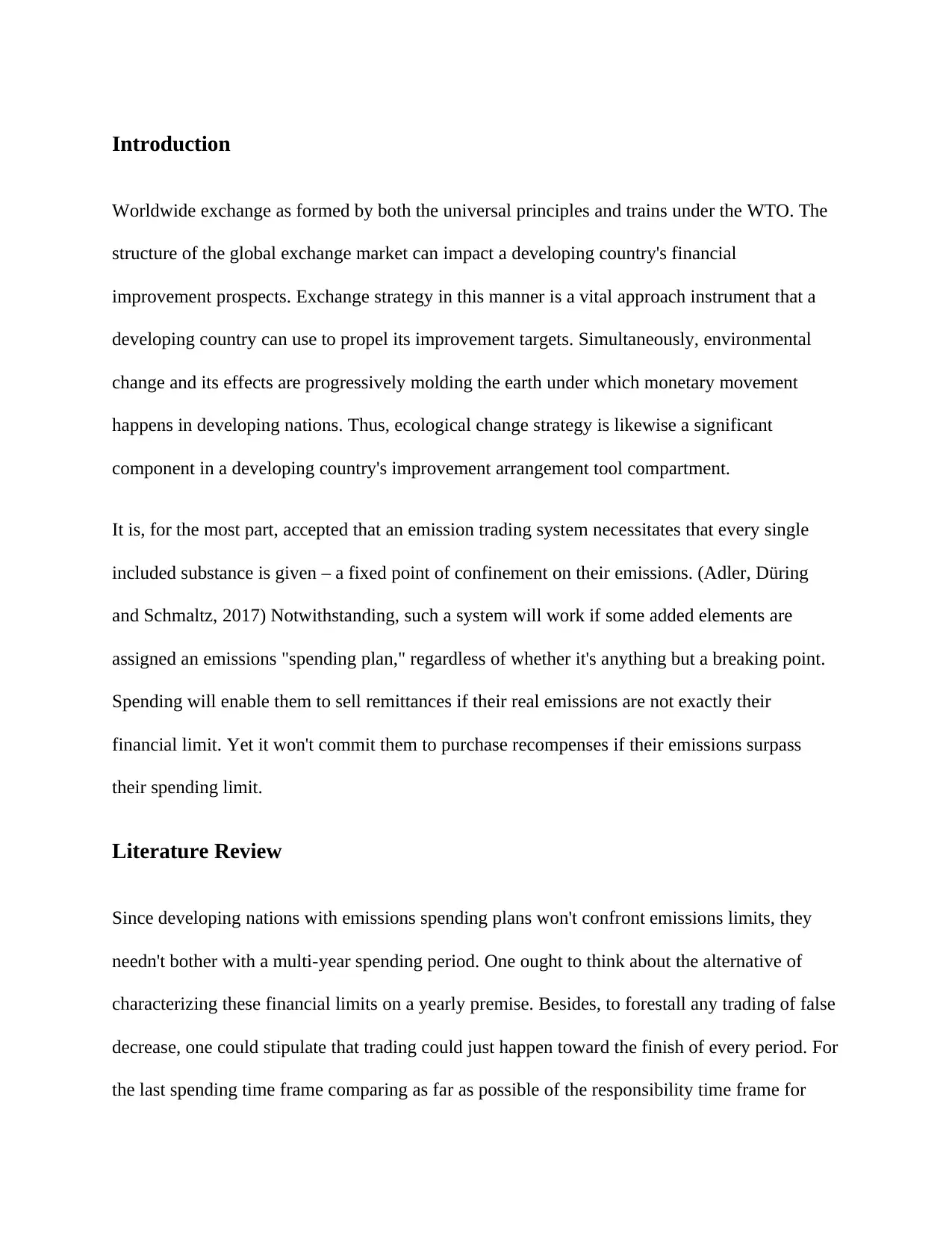
Introduction
Worldwide exchange as formed by both the universal principles and trains under the WTO. The
structure of the global exchange market can impact a developing country's financial
improvement prospects. Exchange strategy in this manner is a vital approach instrument that a
developing country can use to propel its improvement targets. Simultaneously, environmental
change and its effects are progressively molding the earth under which monetary movement
happens in developing nations. Thus, ecological change strategy is likewise a significant
component in a developing country's improvement arrangement tool compartment.
It is, for the most part, accepted that an emission trading system necessitates that every single
included substance is given – a fixed point of confinement on their emissions. (Adler, Düring
and Schmaltz, 2017) Notwithstanding, such a system will work if some added elements are
assigned an emissions "spending plan," regardless of whether it's anything but a breaking point.
Spending will enable them to sell remittances if their real emissions are not exactly their
financial limit. Yet it won't commit them to purchase recompenses if their emissions surpass
their spending limit.
Literature Review
Since developing nations with emissions spending plans won't confront emissions limits, they
needn't bother with a multi-year spending period. One ought to think about the alternative of
characterizing these financial limits on a yearly premise. Besides, to forestall any trading of false
decrease, one could stipulate that trading could just happen toward the finish of every period. For
the last spending time frame comparing as far as possible of the responsibility time frame for
Worldwide exchange as formed by both the universal principles and trains under the WTO. The
structure of the global exchange market can impact a developing country's financial
improvement prospects. Exchange strategy in this manner is a vital approach instrument that a
developing country can use to propel its improvement targets. Simultaneously, environmental
change and its effects are progressively molding the earth under which monetary movement
happens in developing nations. Thus, ecological change strategy is likewise a significant
component in a developing country's improvement arrangement tool compartment.
It is, for the most part, accepted that an emission trading system necessitates that every single
included substance is given – a fixed point of confinement on their emissions. (Adler, Düring
and Schmaltz, 2017) Notwithstanding, such a system will work if some added elements are
assigned an emissions "spending plan," regardless of whether it's anything but a breaking point.
Spending will enable them to sell remittances if their real emissions are not exactly their
financial limit. Yet it won't commit them to purchase recompenses if their emissions surpass
their spending limit.
Literature Review
Since developing nations with emissions spending plans won't confront emissions limits, they
needn't bother with a multi-year spending period. One ought to think about the alternative of
characterizing these financial limits on a yearly premise. Besides, to forestall any trading of false
decrease, one could stipulate that trading could just happen toward the finish of every period. For
the last spending time frame comparing as far as possible of the responsibility time frame for
Secure Best Marks with AI Grader
Need help grading? Try our AI Grader for instant feedback on your assignments.
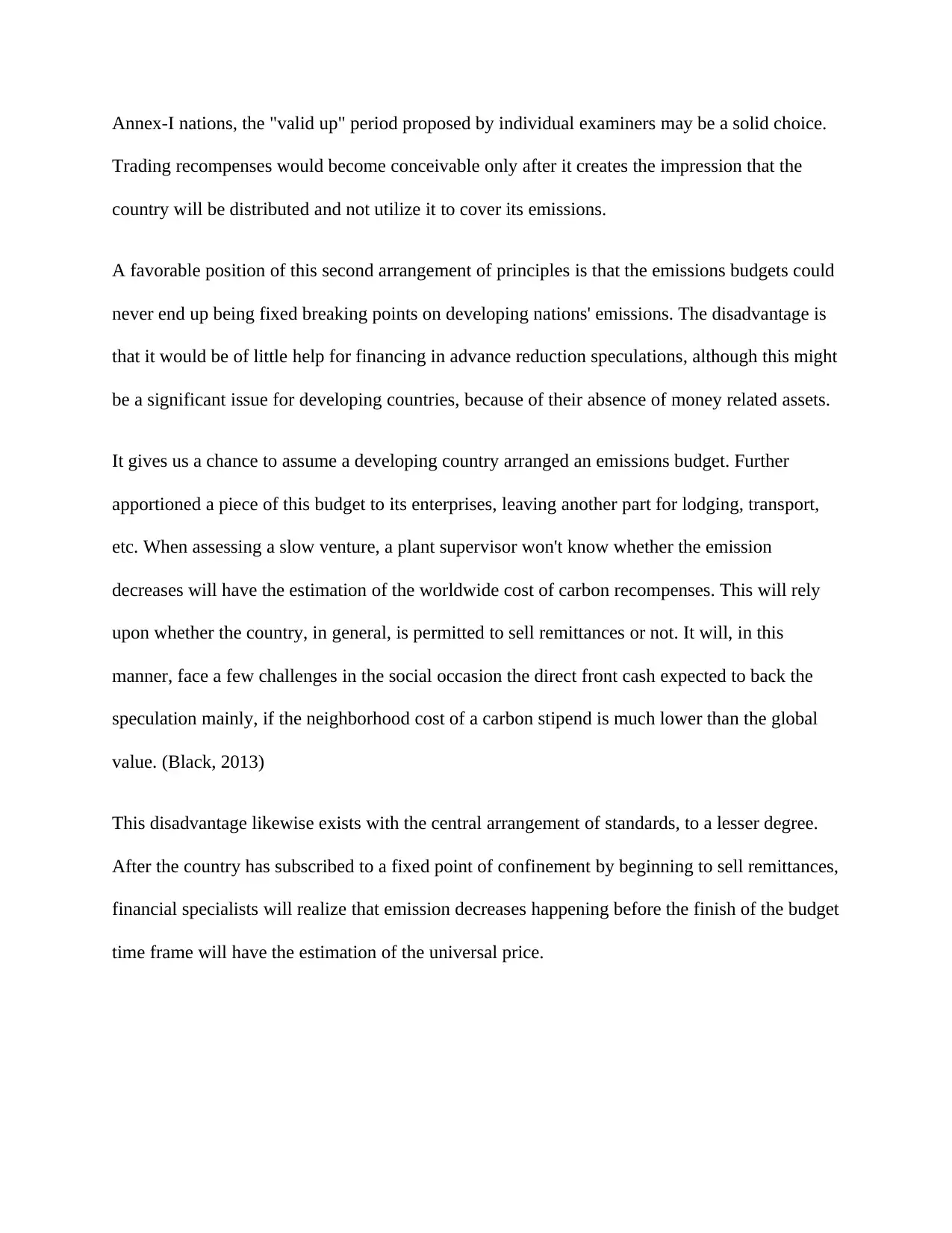
Annex-I nations, the "valid up" period proposed by individual examiners may be a solid choice.
Trading recompenses would become conceivable only after it creates the impression that the
country will be distributed and not utilize it to cover its emissions.
A favorable position of this second arrangement of principles is that the emissions budgets could
never end up being fixed breaking points on developing nations' emissions. The disadvantage is
that it would be of little help for financing in advance reduction speculations, although this might
be a significant issue for developing countries, because of their absence of money related assets.
It gives us a chance to assume a developing country arranged an emissions budget. Further
apportioned a piece of this budget to its enterprises, leaving another part for lodging, transport,
etc. When assessing a slow venture, a plant supervisor won't know whether the emission
decreases will have the estimation of the worldwide cost of carbon recompenses. This will rely
upon whether the country, in general, is permitted to sell remittances or not. It will, in this
manner, face a few challenges in the social occasion the direct front cash expected to back the
speculation mainly, if the neighborhood cost of a carbon stipend is much lower than the global
value. (Black, 2013)
This disadvantage likewise exists with the central arrangement of standards, to a lesser degree.
After the country has subscribed to a fixed point of confinement by beginning to sell remittances,
financial specialists will realize that emission decreases happening before the finish of the budget
time frame will have the estimation of the universal price.
Trading recompenses would become conceivable only after it creates the impression that the
country will be distributed and not utilize it to cover its emissions.
A favorable position of this second arrangement of principles is that the emissions budgets could
never end up being fixed breaking points on developing nations' emissions. The disadvantage is
that it would be of little help for financing in advance reduction speculations, although this might
be a significant issue for developing countries, because of their absence of money related assets.
It gives us a chance to assume a developing country arranged an emissions budget. Further
apportioned a piece of this budget to its enterprises, leaving another part for lodging, transport,
etc. When assessing a slow venture, a plant supervisor won't know whether the emission
decreases will have the estimation of the worldwide cost of carbon recompenses. This will rely
upon whether the country, in general, is permitted to sell remittances or not. It will, in this
manner, face a few challenges in the social occasion the direct front cash expected to back the
speculation mainly, if the neighborhood cost of a carbon stipend is much lower than the global
value. (Black, 2013)
This disadvantage likewise exists with the central arrangement of standards, to a lesser degree.
After the country has subscribed to a fixed point of confinement by beginning to sell remittances,
financial specialists will realize that emission decreases happening before the finish of the budget
time frame will have the estimation of the universal price.
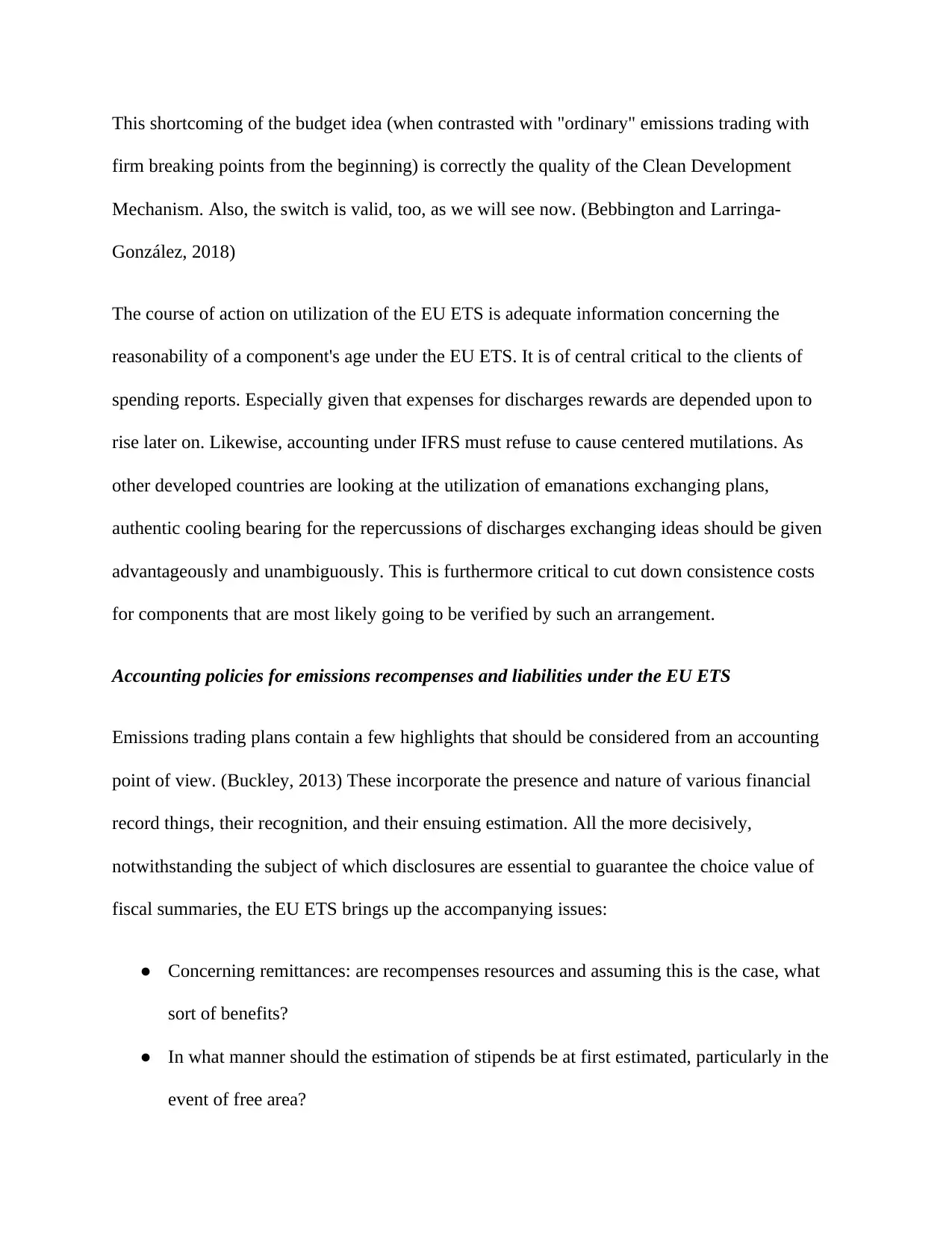
This shortcoming of the budget idea (when contrasted with "ordinary" emissions trading with
firm breaking points from the beginning) is correctly the quality of the Clean Development
Mechanism. Also, the switch is valid, too, as we will see now. (Bebbington and Larringa-
Gonzá lez, 2018)
The course of action on utilization of the EU ETS is adequate information concerning the
reasonability of a component's age under the EU ETS. It is of central critical to the clients of
spending reports. Especially given that expenses for discharges rewards are depended upon to
rise later on. Likewise, accounting under IFRS must refuse to cause centered mutilations. As
other developed countries are looking at the utilization of emanations exchanging plans,
authentic cooling bearing for the repercussions of discharges exchanging ideas should be given
advantageously and unambiguously. This is furthermore critical to cut down consistence costs
for components that are most likely going to be verified by such an arrangement.
Accounting policies for emissions recompenses and liabilities under the EU ETS
Emissions trading plans contain a few highlights that should be considered from an accounting
point of view. (Buckley, 2013) These incorporate the presence and nature of various financial
record things, their recognition, and their ensuing estimation. All the more decisively,
notwithstanding the subject of which disclosures are essential to guarantee the choice value of
fiscal summaries, the EU ETS brings up the accompanying issues:
● Concerning remittances: are recompenses resources and assuming this is the case, what
sort of benefits?
● In what manner should the estimation of stipends be at first estimated, particularly in the
event of free area?
firm breaking points from the beginning) is correctly the quality of the Clean Development
Mechanism. Also, the switch is valid, too, as we will see now. (Bebbington and Larringa-
Gonzá lez, 2018)
The course of action on utilization of the EU ETS is adequate information concerning the
reasonability of a component's age under the EU ETS. It is of central critical to the clients of
spending reports. Especially given that expenses for discharges rewards are depended upon to
rise later on. Likewise, accounting under IFRS must refuse to cause centered mutilations. As
other developed countries are looking at the utilization of emanations exchanging plans,
authentic cooling bearing for the repercussions of discharges exchanging ideas should be given
advantageously and unambiguously. This is furthermore critical to cut down consistence costs
for components that are most likely going to be verified by such an arrangement.
Accounting policies for emissions recompenses and liabilities under the EU ETS
Emissions trading plans contain a few highlights that should be considered from an accounting
point of view. (Buckley, 2013) These incorporate the presence and nature of various financial
record things, their recognition, and their ensuing estimation. All the more decisively,
notwithstanding the subject of which disclosures are essential to guarantee the choice value of
fiscal summaries, the EU ETS brings up the accompanying issues:
● Concerning remittances: are recompenses resources and assuming this is the case, what
sort of benefits?
● In what manner should the estimation of stipends be at first estimated, particularly in the
event of free area?
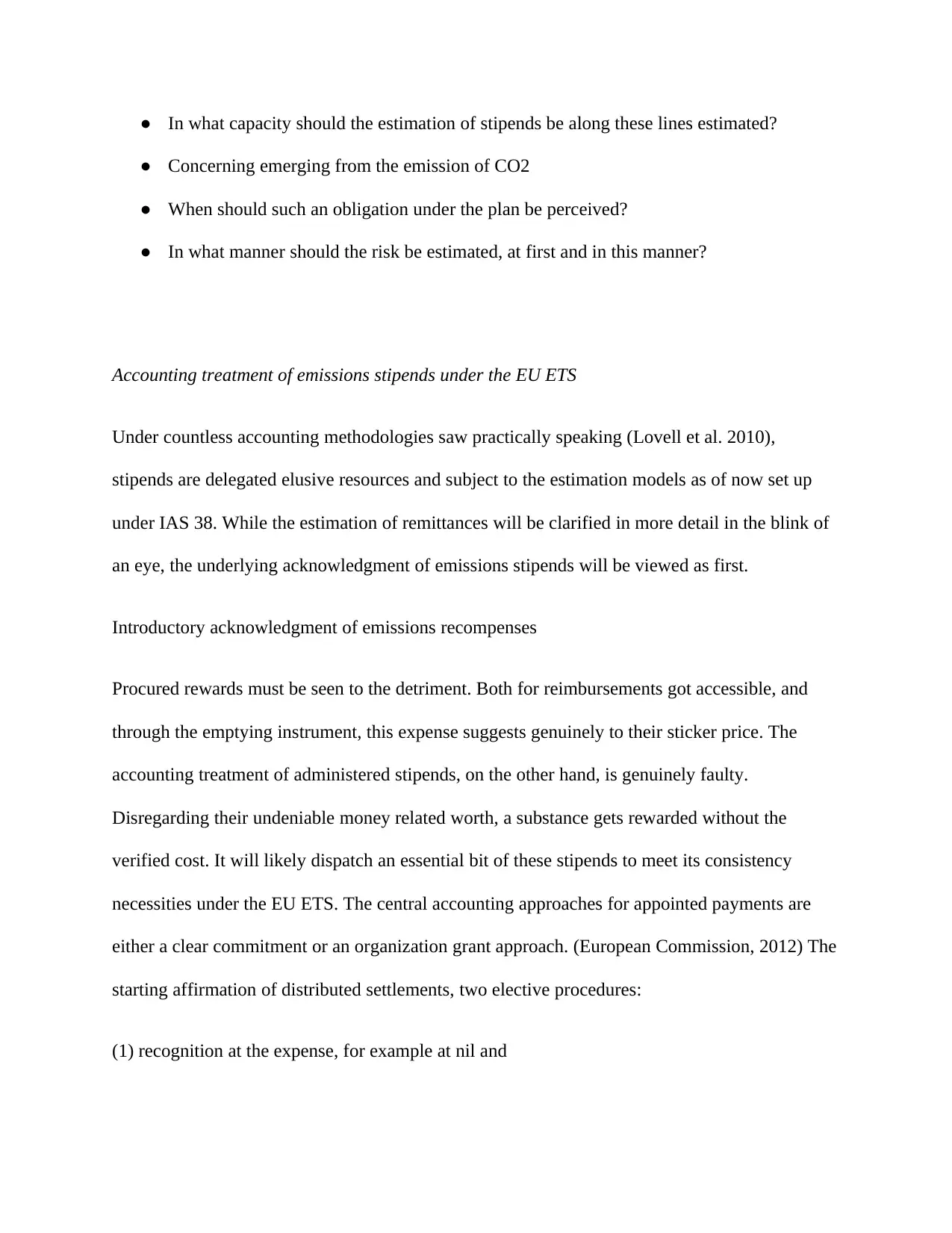
● In what capacity should the estimation of stipends be along these lines estimated?
● Concerning emerging from the emission of CO2
● When should such an obligation under the plan be perceived?
● In what manner should the risk be estimated, at first and in this manner?
Accounting treatment of emissions stipends under the EU ETS
Under countless accounting methodologies saw practically speaking (Lovell et al. 2010),
stipends are delegated elusive resources and subject to the estimation models as of now set up
under IAS 38. While the estimation of remittances will be clarified in more detail in the blink of
an eye, the underlying acknowledgment of emissions stipends will be viewed as first.
Introductory acknowledgment of emissions recompenses
Procured rewards must be seen to the detriment. Both for reimbursements got accessible, and
through the emptying instrument, this expense suggests genuinely to their sticker price. The
accounting treatment of administered stipends, on the other hand, is genuinely faulty.
Disregarding their undeniable money related worth, a substance gets rewarded without the
verified cost. It will likely dispatch an essential bit of these stipends to meet its consistency
necessities under the EU ETS. The central accounting approaches for appointed payments are
either a clear commitment or an organization grant approach. (European Commission, 2012) The
starting affirmation of distributed settlements, two elective procedures:
(1) recognition at the expense, for example at nil and
● Concerning emerging from the emission of CO2
● When should such an obligation under the plan be perceived?
● In what manner should the risk be estimated, at first and in this manner?
Accounting treatment of emissions stipends under the EU ETS
Under countless accounting methodologies saw practically speaking (Lovell et al. 2010),
stipends are delegated elusive resources and subject to the estimation models as of now set up
under IAS 38. While the estimation of remittances will be clarified in more detail in the blink of
an eye, the underlying acknowledgment of emissions stipends will be viewed as first.
Introductory acknowledgment of emissions recompenses
Procured rewards must be seen to the detriment. Both for reimbursements got accessible, and
through the emptying instrument, this expense suggests genuinely to their sticker price. The
accounting treatment of administered stipends, on the other hand, is genuinely faulty.
Disregarding their undeniable money related worth, a substance gets rewarded without the
verified cost. It will likely dispatch an essential bit of these stipends to meet its consistency
necessities under the EU ETS. The central accounting approaches for appointed payments are
either a clear commitment or an organization grant approach. (European Commission, 2012) The
starting affirmation of distributed settlements, two elective procedures:
(1) recognition at the expense, for example at nil and
Secure Best Marks with AI Grader
Need help grading? Try our AI Grader for instant feedback on your assignments.
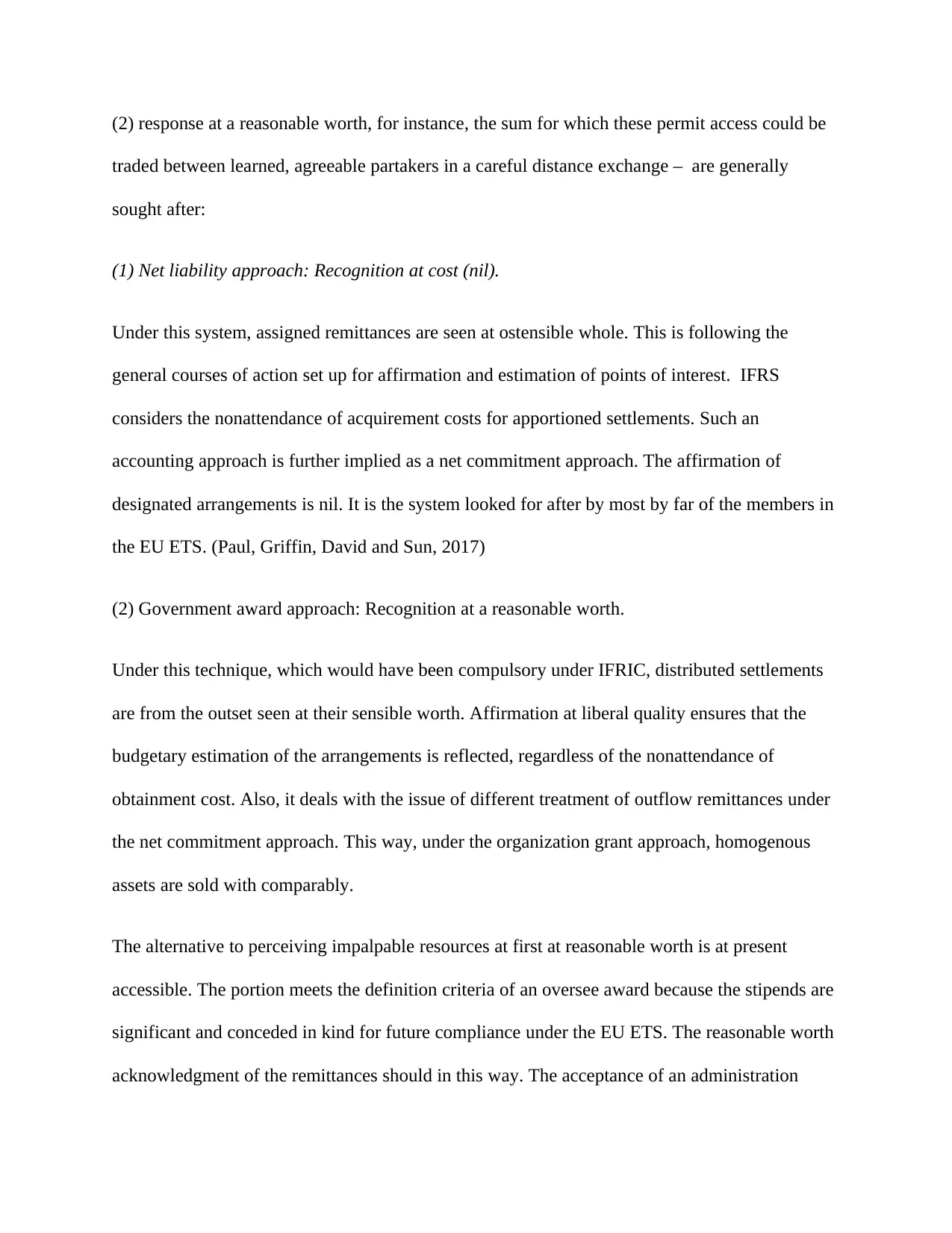
(2) response at a reasonable worth, for instance, the sum for which these permit access could be
traded between learned, agreeable partakers in a careful distance exchange – are generally
sought after:
(1) Net liability approach: Recognition at cost (nil).
Under this system, assigned remittances are seen at ostensible whole. This is following the
general courses of action set up for affirmation and estimation of points of interest. IFRS
considers the nonattendance of acquirement costs for apportioned settlements. Such an
accounting approach is further implied as a net commitment approach. The affirmation of
designated arrangements is nil. It is the system looked for after by most by far of the members in
the EU ETS. (Paul, Griffin, David and Sun, 2017)
(2) Government award approach: Recognition at a reasonable worth.
Under this technique, which would have been compulsory under IFRIC, distributed settlements
are from the outset seen at their sensible worth. Affirmation at liberal quality ensures that the
budgetary estimation of the arrangements is reflected, regardless of the nonattendance of
obtainment cost. Also, it deals with the issue of different treatment of outflow remittances under
the net commitment approach. This way, under the organization grant approach, homogenous
assets are sold with comparably.
The alternative to perceiving impalpable resources at first at reasonable worth is at present
accessible. The portion meets the definition criteria of an oversee award because the stipends are
significant and conceded in kind for future compliance under the EU ETS. The reasonable worth
acknowledgment of the remittances should in this way. The acceptance of an administration
traded between learned, agreeable partakers in a careful distance exchange – are generally
sought after:
(1) Net liability approach: Recognition at cost (nil).
Under this system, assigned remittances are seen at ostensible whole. This is following the
general courses of action set up for affirmation and estimation of points of interest. IFRS
considers the nonattendance of acquirement costs for apportioned settlements. Such an
accounting approach is further implied as a net commitment approach. The affirmation of
designated arrangements is nil. It is the system looked for after by most by far of the members in
the EU ETS. (Paul, Griffin, David and Sun, 2017)
(2) Government award approach: Recognition at a reasonable worth.
Under this technique, which would have been compulsory under IFRIC, distributed settlements
are from the outset seen at their sensible worth. Affirmation at liberal quality ensures that the
budgetary estimation of the arrangements is reflected, regardless of the nonattendance of
obtainment cost. Also, it deals with the issue of different treatment of outflow remittances under
the net commitment approach. This way, under the organization grant approach, homogenous
assets are sold with comparably.
The alternative to perceiving impalpable resources at first at reasonable worth is at present
accessible. The portion meets the definition criteria of an oversee award because the stipends are
significant and conceded in kind for future compliance under the EU ETS. The reasonable worth
acknowledgment of the remittances should in this way. The acceptance of an administration
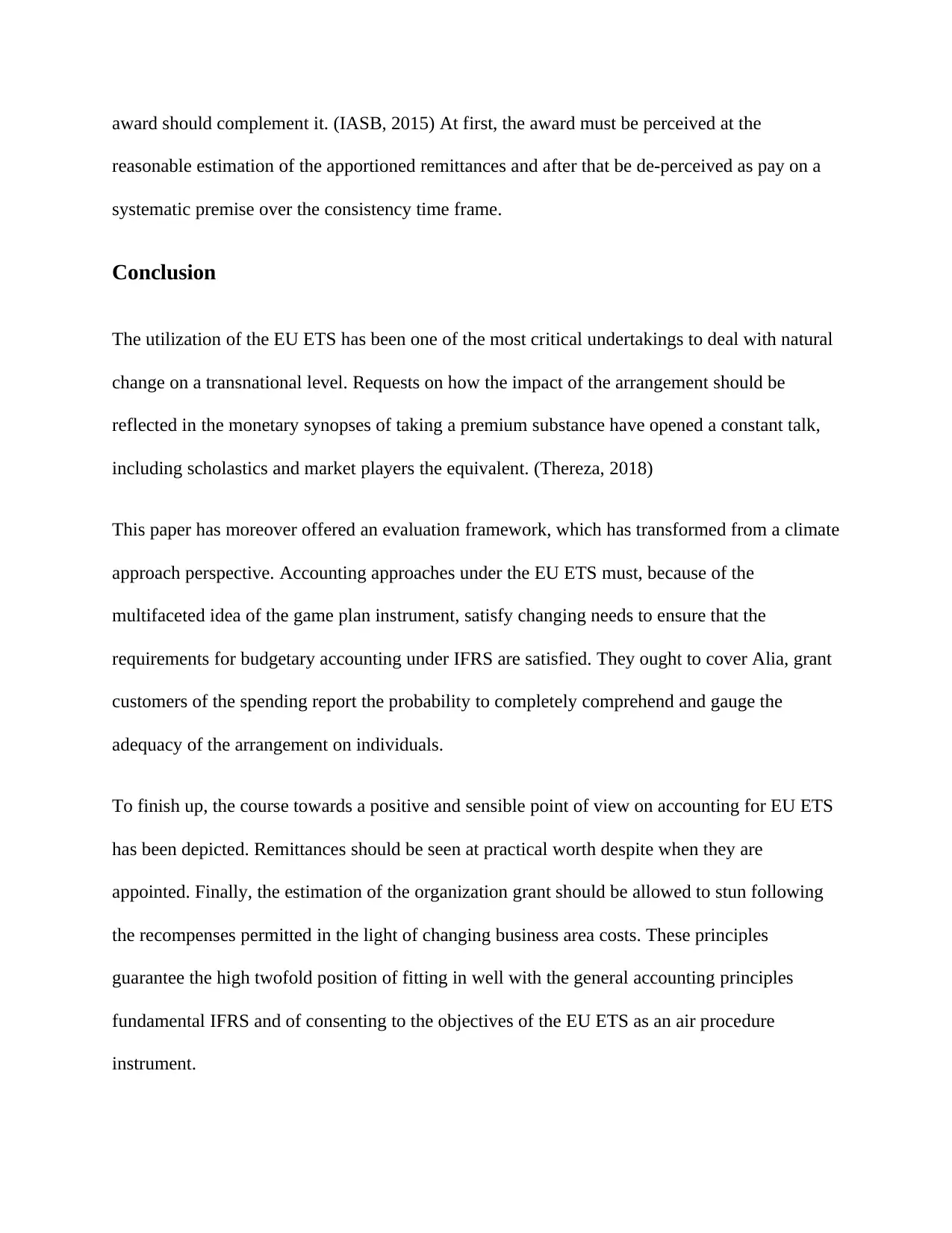
award should complement it. (IASB, 2015) At first, the award must be perceived at the
reasonable estimation of the apportioned remittances and after that be de-perceived as pay on a
systematic premise over the consistency time frame.
Conclusion
The utilization of the EU ETS has been one of the most critical undertakings to deal with natural
change on a transnational level. Requests on how the impact of the arrangement should be
reflected in the monetary synopses of taking a premium substance have opened a constant talk,
including scholastics and market players the equivalent. (Thereza, 2018)
This paper has moreover offered an evaluation framework, which has transformed from a climate
approach perspective. Accounting approaches under the EU ETS must, because of the
multifaceted idea of the game plan instrument, satisfy changing needs to ensure that the
requirements for budgetary accounting under IFRS are satisfied. They ought to cover Alia, grant
customers of the spending report the probability to completely comprehend and gauge the
adequacy of the arrangement on individuals.
To finish up, the course towards a positive and sensible point of view on accounting for EU ETS
has been depicted. Remittances should be seen at practical worth despite when they are
appointed. Finally, the estimation of the organization grant should be allowed to stun following
the recompenses permitted in the light of changing business area costs. These principles
guarantee the high twofold position of fitting in well with the general accounting principles
fundamental IFRS and of consenting to the objectives of the EU ETS as an air procedure
instrument.
reasonable estimation of the apportioned remittances and after that be de-perceived as pay on a
systematic premise over the consistency time frame.
Conclusion
The utilization of the EU ETS has been one of the most critical undertakings to deal with natural
change on a transnational level. Requests on how the impact of the arrangement should be
reflected in the monetary synopses of taking a premium substance have opened a constant talk,
including scholastics and market players the equivalent. (Thereza, 2018)
This paper has moreover offered an evaluation framework, which has transformed from a climate
approach perspective. Accounting approaches under the EU ETS must, because of the
multifaceted idea of the game plan instrument, satisfy changing needs to ensure that the
requirements for budgetary accounting under IFRS are satisfied. They ought to cover Alia, grant
customers of the spending report the probability to completely comprehend and gauge the
adequacy of the arrangement on individuals.
To finish up, the course towards a positive and sensible point of view on accounting for EU ETS
has been depicted. Remittances should be seen at practical worth despite when they are
appointed. Finally, the estimation of the organization grant should be allowed to stun following
the recompenses permitted in the light of changing business area costs. These principles
guarantee the high twofold position of fitting in well with the general accounting principles
fundamental IFRS and of consenting to the objectives of the EU ETS as an air procedure
instrument.
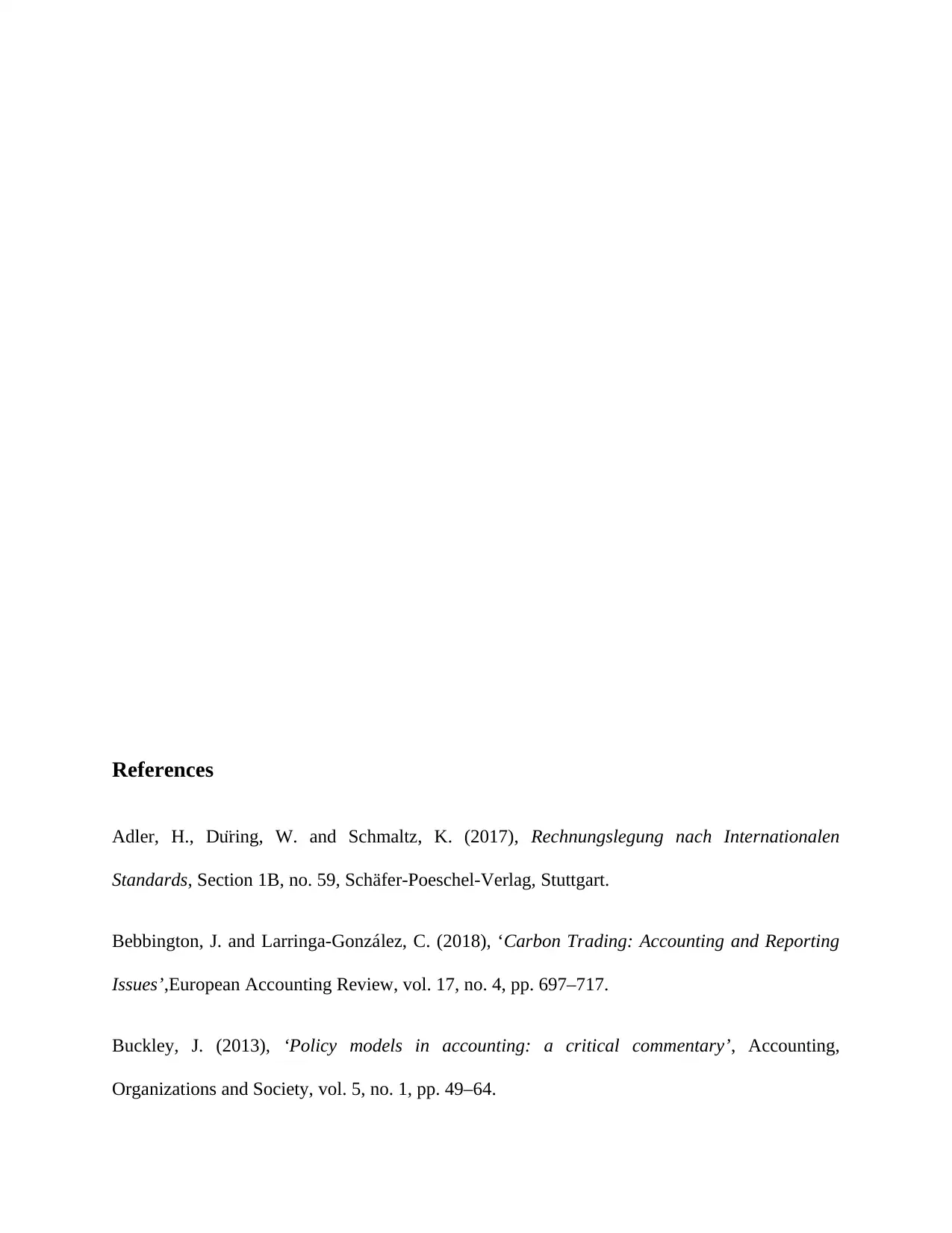
References
Adler, H., Dü ring, W. and Schmaltz, K. (2017), Rechnungslegung nach Internationalen
Standards, Section 1B, no. 59, Schä fer-Poeschel-Verlag, Stuttgart.
Bebbington, J. and Larringa-Gonzá lez, C. (2018), ‘Carbon Trading: Accounting and Reporting
Issues’,European Accounting Review, vol. 17, no. 4, pp. 697–717.
Buckley, J. (2013), ‘Policy models in accounting: a critical commentary’, Accounting,
Organizations and Society, vol. 5, no. 1, pp. 49–64.
Adler, H., Dü ring, W. and Schmaltz, K. (2017), Rechnungslegung nach Internationalen
Standards, Section 1B, no. 59, Schä fer-Poeschel-Verlag, Stuttgart.
Bebbington, J. and Larringa-Gonzá lez, C. (2018), ‘Carbon Trading: Accounting and Reporting
Issues’,European Accounting Review, vol. 17, no. 4, pp. 697–717.
Buckley, J. (2013), ‘Policy models in accounting: a critical commentary’, Accounting,
Organizations and Society, vol. 5, no. 1, pp. 49–64.
Paraphrase This Document
Need a fresh take? Get an instant paraphrase of this document with our AI Paraphraser
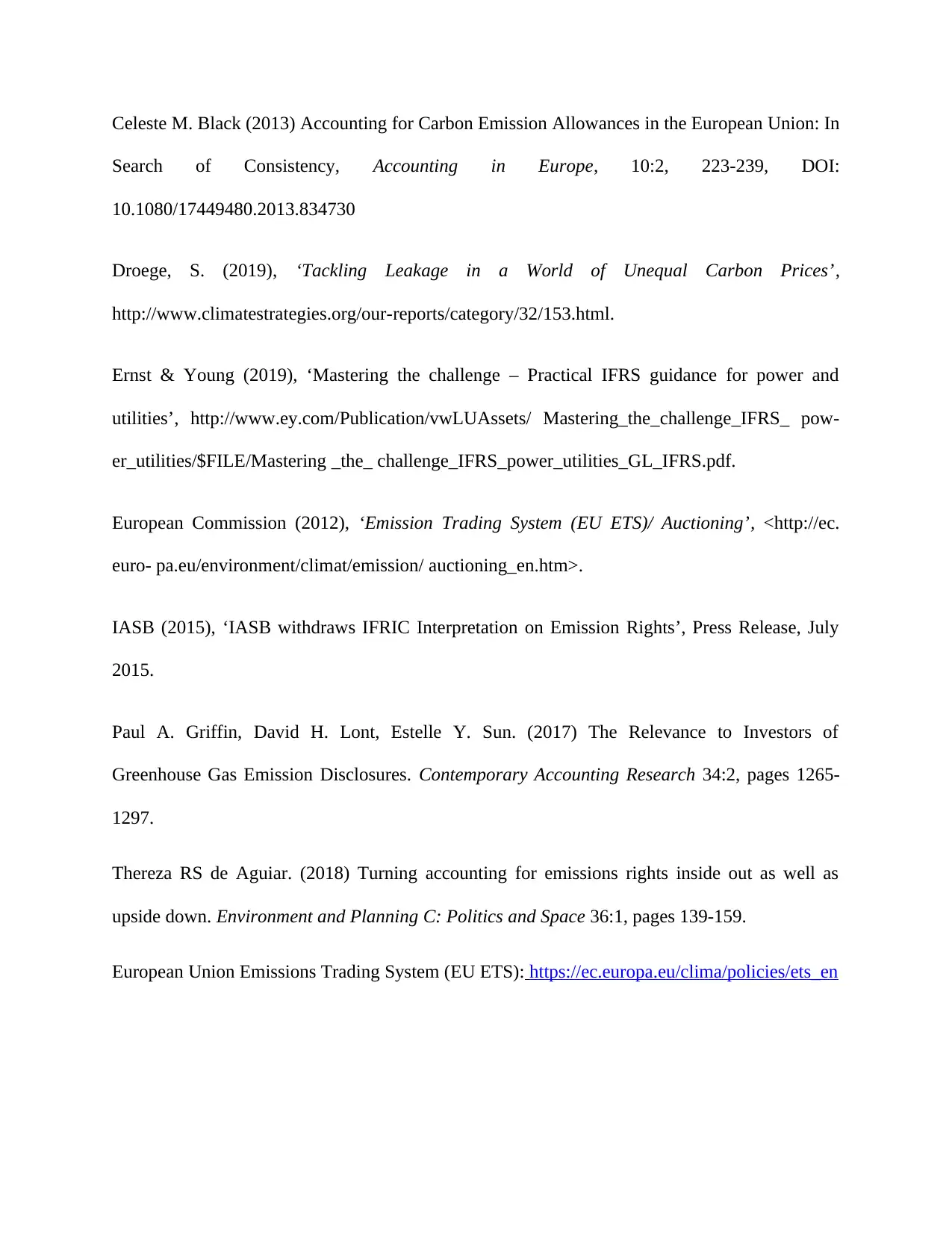
Celeste M. Black (2013) Accounting for Carbon Emission Allowances in the European Union: In
Search of Consistency, Accounting in Europe, 10:2, 223-239, DOI:
10.1080/17449480.2013.834730
Droege, S. (2019), ‘Tackling Leakage in a World of Unequal Carbon Prices’,
http://www.climatestrategies.org/our-reports/category/32/153.html.
Ernst & Young (2019), ‘Mastering the challenge – Practical IFRS guidance for power and
utilities’, http://www.ey.com/Publication/vwLUAssets/ Mastering_the_challenge_IFRS_ pow-
er_utilities/$FILE/Mastering _the_ challenge_IFRS_power_utilities_GL_IFRS.pdf.
European Commission (2012), ‘Emission Trading System (EU ETS)/ Auctioning’, <http://ec.
euro- pa.eu/environment/climat/emission/ auctioning_en.htm>.
IASB (2015), ‘IASB withdraws IFRIC Interpretation on Emission Rights’, Press Release, July
2015.
Paul A. Griffin, David H. Lont, Estelle Y. Sun. (2017) The Relevance to Investors of
Greenhouse Gas Emission Disclosures. Contemporary Accounting Research 34:2, pages 1265-
1297.
Thereza RS de Aguiar. (2018) Turning accounting for emissions rights inside out as well as
upside down. Environment and Planning C: Politics and Space 36:1, pages 139-159.
European Union Emissions Trading System (EU ETS): https://ec.europa.eu/clima/policies/ets_en
Search of Consistency, Accounting in Europe, 10:2, 223-239, DOI:
10.1080/17449480.2013.834730
Droege, S. (2019), ‘Tackling Leakage in a World of Unequal Carbon Prices’,
http://www.climatestrategies.org/our-reports/category/32/153.html.
Ernst & Young (2019), ‘Mastering the challenge – Practical IFRS guidance for power and
utilities’, http://www.ey.com/Publication/vwLUAssets/ Mastering_the_challenge_IFRS_ pow-
er_utilities/$FILE/Mastering _the_ challenge_IFRS_power_utilities_GL_IFRS.pdf.
European Commission (2012), ‘Emission Trading System (EU ETS)/ Auctioning’, <http://ec.
euro- pa.eu/environment/climat/emission/ auctioning_en.htm>.
IASB (2015), ‘IASB withdraws IFRIC Interpretation on Emission Rights’, Press Release, July
2015.
Paul A. Griffin, David H. Lont, Estelle Y. Sun. (2017) The Relevance to Investors of
Greenhouse Gas Emission Disclosures. Contemporary Accounting Research 34:2, pages 1265-
1297.
Thereza RS de Aguiar. (2018) Turning accounting for emissions rights inside out as well as
upside down. Environment and Planning C: Politics and Space 36:1, pages 139-159.
European Union Emissions Trading System (EU ETS): https://ec.europa.eu/clima/policies/ets_en

Parliament of Australia (2013) Emission Trading Schemes around the world:
https://www.aph.gov.au/About_Parliament/Parliamentary_Departments/Parliamentary_Library/
pubs/BN/2012-2013/EmissionsTradingSchemes
https://www.aph.gov.au/About_Parliament/Parliamentary_Departments/Parliamentary_Library/
pubs/BN/2012-2013/EmissionsTradingSchemes
1 out of 9
Your All-in-One AI-Powered Toolkit for Academic Success.
+13062052269
info@desklib.com
Available 24*7 on WhatsApp / Email
![[object Object]](/_next/static/media/star-bottom.7253800d.svg)
Unlock your academic potential
© 2024 | Zucol Services PVT LTD | All rights reserved.